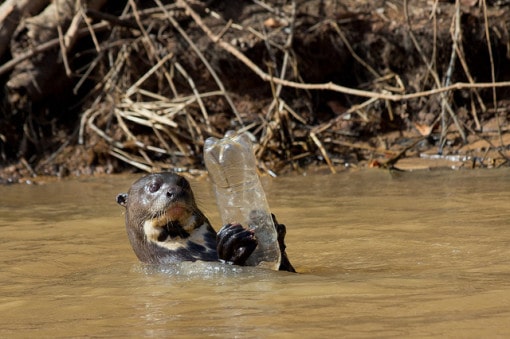This is a Clilstore unit. You can .
I'm a visual artist, and I'm also one of the co-founders of the Plastic Pollution Coalition. I've been working with plastic bags, which I cut up and sew back together as my primary material for my artwork for the last 20 years. I turn them into two and three-dimensional pieces and sculptures and installations. Upon working with the plastic, after about the first eight years, some of my work started to fissure and break down into smaller little bits of plastic. And I thought, "Great. It's ephemeral just like us."

Upon educating myself a little further about plastics, I actually realized this was a bad thing. It's a bad thing that plastic breaks down into smaller little bits, because it's always still plastic. And what we're finding is that a lot of it is in the marine environment. I then, in the last few years, learned about the Pacific garbage patch and the gyre. And my initial reaction — and I think this is a lot of people's first reaction to learning about it — is, "Oh my God! We've got to go out there and clean this thing up." So I actually developed a proposal to go out with a cargo ship and two decommissioned fishing trawlers, a crane, a chipping machine and a cold-molding machine. And my intention was to go out to the gyre, raise awareness about this issue and begin to pick up the plastic, chip it into little bits and cold mold it into bricks that could potentially be used as building materials in underdeveloped communities.
I began talking with people who actually had been out to the gyre and were studying the plastic problem in the marine environment and upon doing so, I realized actually that cleaning it up would be a very small drop in the bucket relative to how much is being generated every day around the world, and that actually I needed to back up and look at the bigger picture. And the bigger picture is: we need to find a way to turn off the faucet. We need to cut the spigot of single-use and disposable plastics, which are entering the marine environment every day on a global scale.So in looking at that, I also realized that I was really angry. I wasn't just concerned about plastic that you're trying to imagine out in the middle of the Pacific Ocean — of which I have learned there are now11 gyres, potentially, of plastic in five major oceans in the world. It's not just that gyre of plastic that I'm concerned about — it's the gyre of plastic in the supermarket. I'd go to the supermarket and all of my food is packaged in plastic. All of my beverages are packaged in plastic, even at the health food market.I'm also concerned about the plastic in the refrigerator, and I'm concerned about the plastic and the toxins that leach from plastic into us and into our bodies.
So I came together with a group of other people who were all looking at this issue, and we created the Plastic Pollution Coalition. We have many initiatives that we're working on, but some of them are very basic. One is: if 80 to 90 percent of what we're finding in the ocean — of the marine debris that we're finding in the ocean — is plastic, then why don't we call it what it is. It's plastic pollution. Recycling — everybody kind of ends their books about being sustainable and greening with the idea of recycling. You put something in a bin and you don't have to think about it again. What is the reality of that? In the United States, less than seven percent of our plastics are recycled. And if you really look into it, particularly when it comes to plastic bottles, most of it is only down-cycled, or incinerated, or shipped to China. It is down-cycled and turned into lesser things, while a glass bottle can be a glass bottle again or can be used again — a plastic bottle can never be a plastic bottle again.
So this is a big issue for us. Another thing that we're looking at and asking people to think about is we've added a fourth R onto the front of the "Reduce, Reuse, Recycle," three R's, and that is refuse. Whenever possible, refuse single-use and disposable plastics. Alternatives exist; some of them are very old-school.I myself am now collecting these cool Pyrex containers and using those instead of Glad and Tupperware containers to store food in. And I know that I am doing a service to myself and my family. It's very easy to pick up a stainless-steel bottle or a glass bottle, if you're traveling and you've forgotten to bring your stainless-steel bottle and fill that up with water or filtered water, versus purchasing plastic bottled water.
I guess what I want to say to everybody here — and I know that you guys know a lot about this issue —is that this is a huge problem in the oceans, but this is a problem that we've created as consumers and we can solve. We can solve this by raising awareness of the issue and teaching people to choose alternatives. So whenever possible, to choose alternatives to single-use plastics. We can cut the stem — tide the stem of this into our oceans and in doing so, save our oceans, save our planet, save ourselves.
Thank you. (Applause)
Short url: https://multidict.net/cs/5146